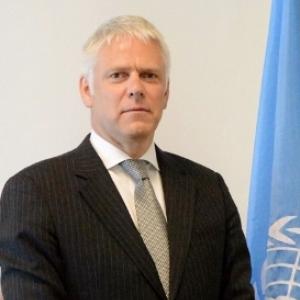This Pride Month, the United Nations (UN) in the Philippines stands in solidarity with the community of lesbian, gay, bisexual, transgender, queer, and intersex (LGBTQI) Filipinos, their families, friends and allies in their pursuit of equality, inclusion and pride.
The struggle for the rights of LGBTQI people is a core part of the struggle for the full and equal enjoyment of human rights by all.
The very first article of the Universal Declaration of Human Rights proclaims that, “All human beings are born free and equal in dignity and rights.”
All human beings – not some, not most, but all.
And yet, in the Philippines as in other parts of the world, members of the LGBTQI community continue to face barriers to equal access to education, healthcare, employment, and other rights that are guaranteed by national and international laws. The LGBTQI community contends with many of the same discriminations that stand in the way of women, indigenous people, Persons with Disabilities, Persons Living with HIV, and other groups as they stake their claim to their social, political and economic rights. It is essential that we defend and protect all of these groups from every kind of discrimination so that no one is left behind.
Since 1996 LGBTQI Filipinos have been celebrating Pride to advocate for greater promotion and recognition of their rights and freedoms that are protected under Philippine and international law, and for protection from prejudice, discrimination, and violence because of their sexual orientation, gender identity, gender expression or sex characteristics (SOGIESC).
LGBTQI organizations in the Philippines, civil society organizations, the private sector, government agencies, and local government units have tirelessly worked together to address the challenges that LGBTQI Filipinos face, particularly through gender-responsive policies in education, SOGIESC-inclusive workplaces, and anti-discrimination legislation in various parts of the country, among others. As a partner of these groups, organizations, and institutions, the UN Philippines supports initiatives to achieve full recognition of the rights of LGBTQI Filipinos.
We commend the cities and provinces in the Philippines that have adopted and are implementing ordinances that prohibit discrimination on the basis of a person’s sexual orientation and gender identity and expression (SOGIE). Unfortunately, these local government units are still in the minority. Only 21 of the 1,634 cities and municipalities and six out of the 81 provinces in the Philippines have anti-discrimination ordinances (ADOs). This leaves 79.2% of Filipinos, or close to 80 million people, without protection against SOGIE-based discrimination.
Furthermore, the protection afforded by these ADOs varies across different areas. Not all of the LGUs that have enacted ADOs have also passed Implementing Rules and Regulations (IRRs). Thus, the ADOs could remain unenforceable.
The UN Philippines therefore affirms its support for the LGBTQI community’s call for the passage of the SOGIE Equality Bill and urges renewed efforts to push for its enactment by the 18th session of Congress.
The United Nations is committed to action.
Just two years ago, the Human Rights Council decided to appoint the first ever UN Independent Expert on the protection against violence and discrimination based on sexual orientation and gender identity. Victor Madrigal-Borloz took up his mandate on 1 January 2018. This was a historic step.
We work with decision makers, human rights institutions and community leaders around the world to change discriminatory laws and put legal protections in place.
But as we all know, legal change is not enough—we also need social and cultural change.
The stigma perpetuating the abuses against LGBTQI people is often rooted in deeply held beliefs about gender, family, tradition and religion. And reactionary forces are not shying away from weaponizing people’s fears of the unfamiliar for their own political gains. Moreover, equality cannot be won by the LGBTQI community alone – they need allies who will use their influence and voice to promote equality for the LGBTQI community.
Recognizing this need, the UN human rights office launched the UN Free & Equal campaign in July 2013 – an unprecedented global UN public information campaign aimed at promoting equal rights and fair treatment of LGBTQI people. It is being implemented by UN and non-UN partners at the country level.
We are also looking at ourselves and what we can do better to ensure that members of the LGBTQI community among our staff enjoy an accepting and equal workplace. UN Globe is a network of UN staff that advocates for the equality and non-discrimination of LGBTQI staff in the UN system and its peacekeeping operations.
We have momentum on our side. But we need to come together to address the remaining challenges. The Metro Manila Pride March and Festival this Saturday offers one such opportunity and the UN Philippines will join in the celebration under the banners of UN Free & Equal, and UN Globe.
You and I and people of conscience everywhere must keep pushing until we realize the promise of the Universal Declaration of Human Rights for all people. The freedom, dignity and equal rights that all people are born with—should and must be a living reality for the LGBTQI community each and every day of their lives.
[Ends]



